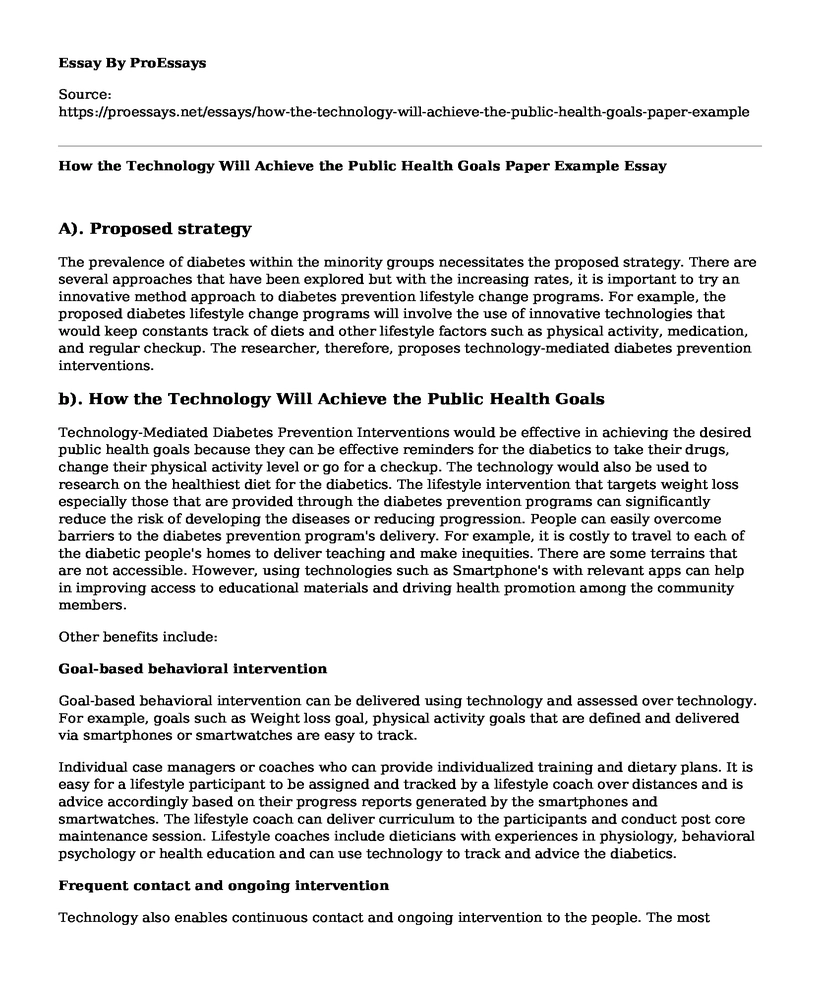A). Proposed strategy
The prevalence of diabetes within the minority groups necessitates the proposed strategy. There are several approaches that have been explored but with the increasing rates, it is important to try an innovative method approach to diabetes prevention lifestyle change programs. For example, the proposed diabetes lifestyle change programs will involve the use of innovative technologies that would keep constants track of diets and other lifestyle factors such as physical activity, medication, and regular checkup. The researcher, therefore, proposes technology-mediated diabetes prevention interventions.
b). How the Technology Will Achieve the Public Health Goals
Technology-Mediated Diabetes Prevention Interventions would be effective in achieving the desired public health goals because they can be effective reminders for the diabetics to take their drugs, change their physical activity level or go for a checkup. The technology would also be used to research on the healthiest diet for the diabetics. The lifestyle intervention that targets weight loss especially those that are provided through the diabetes prevention programs can significantly reduce the risk of developing the diseases or reducing progression. People can easily overcome barriers to the diabetes prevention program's delivery. For example, it is costly to travel to each of the diabetic people's homes to deliver teaching and make inequities. There are some terrains that are not accessible. However, using technologies such as Smartphone's with relevant apps can help in improving access to educational materials and driving health promotion among the community members.
Other benefits include:
Goal-based behavioral intervention
Goal-based behavioral intervention can be delivered using technology and assessed over technology. For example, goals such as Weight loss goal, physical activity goals that are defined and delivered via smartphones or smartwatches are easy to track.
Individual case managers or coaches who can provide individualized training and dietary plans. It is easy for a lifestyle participant to be assigned and tracked by a lifestyle coach over distances and is advice accordingly based on their progress reports generated by the smartphones and smartwatches. The lifestyle coach can deliver curriculum to the participants and conduct post core maintenance session. Lifestyle coaches include dieticians with experiences in physiology, behavioral psychology or health education and can use technology to track and advice the diabetics.
Frequent contact and ongoing intervention
Technology also enables continuous contact and ongoing intervention to the people. The most common technology used includes smartphones and diabetes prevention programs can be designed and delivered over the phones. The DPP programs can also be effective in assessing the efficiency of lifestyle changes in the prevention and delays of diabetes. The smartphones apps can help in flexibly maintaining programs of both groups and individual classes. Additionally, the motivational campaign can also be delivered over technologies such as smartphone apps.
c). Resources Required
The resources required for this approach is mainly financial resources to develop mobile phones apps designed specifically for DPP. The money would also be used for buying and distributing the smartphones to all the participants who are either diabetics or at risk of diabetes. Finally, financial resources would be used to pay the coaches who will delivery both expertise and emotional support to motivate the participants
d). Advantages and disadvantages of the strategy
The main advantages of the strategy are that it is accessible over large distances. as such a curriculum and training can be offered online over distances without having to travel to meet the individual or the groups. Secondly, the strategy is effective as only3 to five coaches or case manager are required to deliver the lessons to 40 people. It is therefore very cost effective whenever participants are sparsely distributed over difficult terrain with poor transport infrastructures. The training can be delivered round the clock without difficulties.
The main disadvantage is that the course may not be helpful to tor elderly population who are not technology savvy. For example, not all elderly people can download apps and use the apps for reminder, training and lifestyle change. Additionally, are highly niche dependants and may not be effective across all age groups.
Cite this page
How the Technology Will Achieve the Public Health Goals Paper Example. (2022, Sep 22). Retrieved from https://proessays.net/essays/how-the-technology-will-achieve-the-public-health-goals-paper-example
If you are the original author of this essay and no longer wish to have it published on the ProEssays website, please click below to request its removal:
- Article Analysis Example: Competition Would Be the Best Solution to Rising Drug Prices
- Paper Example on Elderly Caregiving
- Essay Sample on Impact of Cannabis on PTSD Recovery
- Essay Sample on Diabetes as One of the Major Global Health Problem
- Creating a Supportive Environment for Disabled Children - Essay Sample
- Preparing African Women for PrEP: Rethinking HIV Prevention - Annotated Bibliography
- Android OS Evolves: From Smartphones to Tablets & Beyond - Essay Sample







